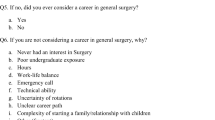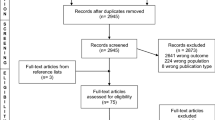Abstract
Background
Surgery is a profoundly exciting and rewarding profession, so it is alarming to see a diminishing of passion for the field in the trainees that are now coming through our doors. The attrition rate of surgical residents is unacceptably high, especially when compared with other fields.
Methods
To investigate potential causes behind the current high attrition rates seen in general surgery residency programs. Medline was searched (January 1990 to November 2009). The Internet was searched (Google) for informational sites, newsletters, and informally published articles.
Results
Attrition rates in general surgery residency programs are ≥20%, and many residents withdrawing from the programs go to other fields. The implementation of the 80-hour work week, while reported to improve quality of life, has not reduced attrition rates, presumably because the same amount of material needs to be learned in what is now a shorter period of time. The use of physician extenders to relieve residents of routine floor work that does not contribute to residency training is one solution. Another is the reformulation of clinical duties to make time use more efficient. Most importantly, recruitment should be restricted to those students with the intellectual, physical, behavioral, and emotional traits that make them suitable for the field of surgery.
Conclusions
Attrition rates from general surgery residencies may be reduced by increasing the efficiency of the training programs to optimize time use. Recruitment should target those students who have, or who are most likely to develop, a passion for the art of surgery.

Similar content being viewed by others
Reference
Leigh JP, Kravitz RL, Schembri M, Samuels SJ, Mobley S. Physician career satisfaction across specialties. Arch Intern Med. 2002;162:1577–84.
Aufses AH, Slater GI, Holler LH. The nature and fate of categorical surgical residents who “drop out.” Am J Surg. 1998;175:236–9.
Dodson TG, Webb AL. Why do residents leave general surgery? The hidden problem in today’s programs. Curr Surg. 2005;62:128–31.
Naylor RA, Reisch JS, Valentine RJ. Factors related to attrition in surgery residency based on application data. Arch Surg. 2008;143:647–52.
Longo WE, Seashore J, Duffy A, Udelsman R. Attrition of categoric general surgery residents: results of a 20-year audit. Am J Surg. 2009;197:774–8.
Hatton MP, Loewenstein J. Attrition from ophthalmology residency programs. Am J Ophthalmol. 2004;138:863–4.
Gilpin MM. Residency attrition rate in obstetrics and gynecology: are we losing more postgraduates today? Am J Obstet Gynecol. 2005;193:1804–6.
Laufenburg HG, Turkal NW, Baumgardner DJ. Resident attrition from family practice residencies: United States versus international medical graduates. Fam Med. 1994;26:614–7.
Pettitt BJ. Medical student concerns and fears before their third-year surgical clerkship. Am J Surg. 2005;189:492–6.
Goldin SB, Wahi MM, Farooq OS, et al. Student quality-of-life declines during third year surgical clerkship. J Surg Res. 2007;143:151–7.
Ad Hoc Committee for the Liaison Committee on Medical Education representing the Association of American Medical Colleges and the American Medical Association. Report on the Survey of the George Washington University School of Medicine. March 5–8, 2001. Washington, DC: George Washington University School of Medicine; 2001.
Everett CB, Helmer SD, Osland JS, Smith RS. General surgery resident attrition and the 80-hour workweek. Am J Surg. 2007;194:751–7.
Evans S, Sarani B. The modern medical school graduate and general surgical training. Are they compatible? Arch Surg. 2002;137:274–7.
Snyder RA, Bills JL, Phillips SE, Tarpley MJ, Tarpley JL. Specific interventions to increase women’s interest in surgery. J Am Coll Surg. 2008;207:942–7.
Gelfand DV, Podnos YD, Carmichael JC, et al. Effect of the 80-hour workweek on resident burnout. Arch Surg. 2004;139:933–40.
Hutter MM, Kellogg KC, Ferguson CM, Abbott WM, Warshaw AL. The impact of the 80-hour workweek on surgical residents and attending surgeons. Ann Surg. 2006;243:864–75.
Kohanzadeh S, Hayase Y, Lefor MK, Nagata Y, Lefor A. Factors affecting attrition in graduate surgical education. Am Surg. 2007;73:963–6.
Leibrandt TJ, Pezzi CM, Fassler SA. Has the 80-hour work week had an impact on voluntary attrition in general surgery residency programs? J Am Coll Surg. 2006;202:340–4.
Brasher AE, Chowdhry S, Hauge LS, et al. Medical students’ perception of resident teaching: have duty hours regulations had an impact? Ann Surg. 2006;242:548–54.
Podnos YD, Williams RA, Jiminez JC, et al. Reducing the noneducational and nonclinical workload of the surgical resident;defining the role of the health technician. Curr Surg. 2003;60:529–32.
Victorino GP, Organ CH Jr. Physician assistant influence on surgery residents. Arch Surg. 2003;138:971–6.
Stahlfeld KR, Robinson JM, Burton EC. What do physician extenders in a general surgery residency really do? J Surg Educ. 2008;65:354–8.
Buch KE, Genovese MY, Conigliaro JL, et al. Non-physician practitioners’ overall enhancement to a surgical resident’s experience. J Surg Educ. 2008;65:50–53.
Chung RS, Ahmed N. How surgical residents spend their training time. The effect of a goal-oriented work style on efficiency and work satisfaction. Arch Surg. 2007;142:249–52.
American College of Surgeons. So, you want to be a surgeon! Section I: surgical traits. http://www.facs.org/residencysearch/traits/traits.html. Accessed 25 May 2009.
O’Connell VA. Getting cut: failing to survive surgical residency training. Lanham, MD: University Press of America; 2007.
Kaufman HH, Weingard RL, Tunick RH. Teaching surgeons to operate: principles of psychomotor skills training. Acta Neurochir (Wien). 1987;87:1–7.
Fox NJ. The social meaning of surgery. Philadelphia: Open University Press; 1992.
Kavic MS. Surgery, passion, and the medical student. J Soc Laparoendosc Surg. 1999;3:169–70.
Andriole DA, Jeffe DB, Klingensmith M. Do general surgery applicants really want to be general surgeons? Curr Surg. 2006;63:145–50.
Cofer JB, Biderman MD, Lewis PL, et al. Is the quality of surgical residency applicants deteriorating? Am J Surg. 2001;181:44–9.
Callcut R, Snow M, Lewis B, Chen H. Do the best students go into general surgery? J Surg Res. 2003;115:69–73.
Lowenfals AB. Recruitment and retention of residents: lessons learned and prescription for the future. A review of a symposium presented at the American College of Surgeons Spring Meeting, April 12–15, 2003, New York. http://www.medscape.com/viewprogram/2325_pnt. Accessed 15 May 2009.
Thoman C. Cut and run: why I quit surgical residency. New Physician. 2007;56. http://www.amsa.org/tnp/articles/article.cfx?id=397. Accessed 4 Mar 2009.
Berman L, Rosenthal MS, Curry LA, Evans LV, Gusberg RJ. Attracting surgical clerks to surgical careers: role models, mentoring, and engagement in the operating room. J Am Coll Surg. 2008;207:793–800.
Author information
Authors and Affiliations
Rights and permissions
About this article
Cite this article
Singletary, S.E. A Fire in Our Hearts: Passion and the Art of Surgery. Ann Surg Oncol 17, 364–370 (2010). https://doi.org/10.1245/s10434-009-0732-x
Received:
Published:
Issue Date:
DOI: https://doi.org/10.1245/s10434-009-0732-x




